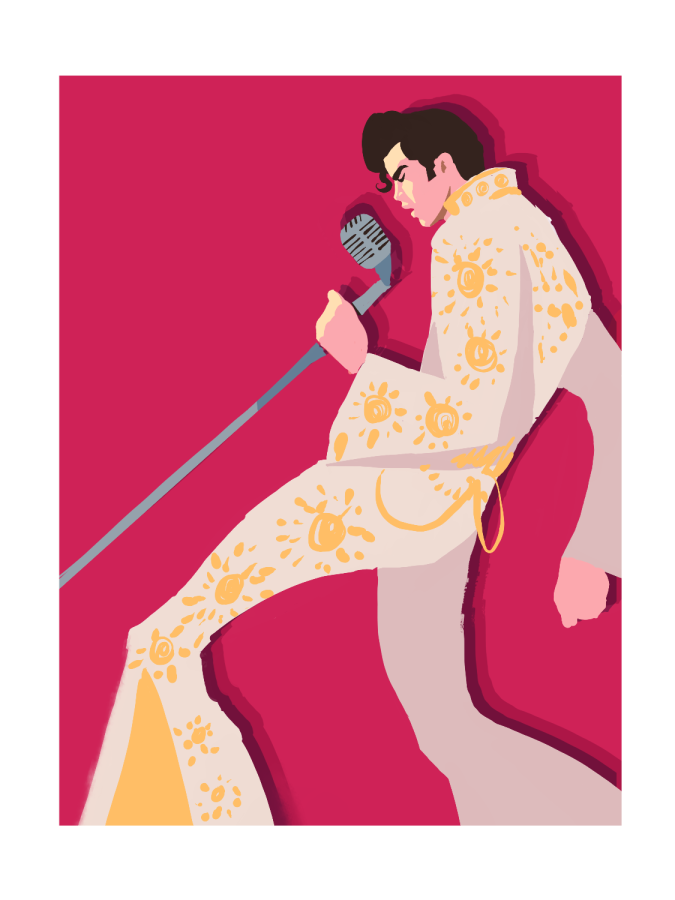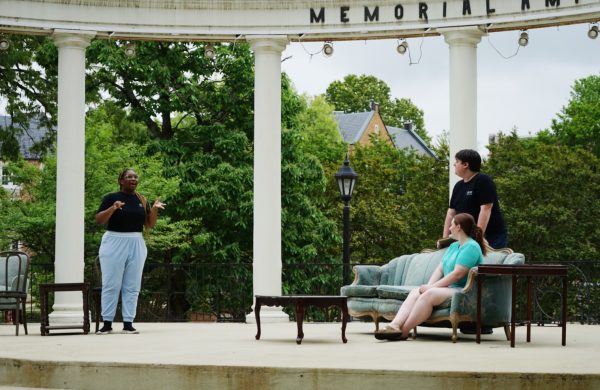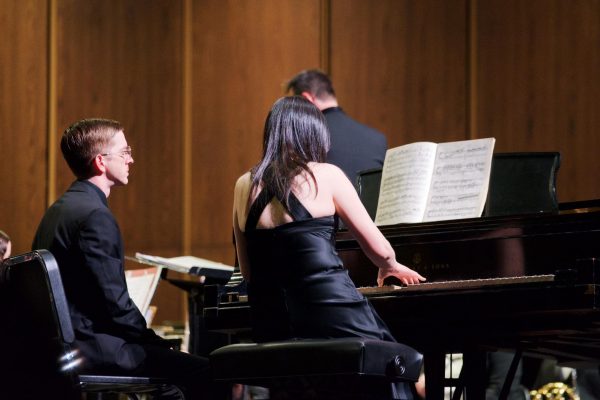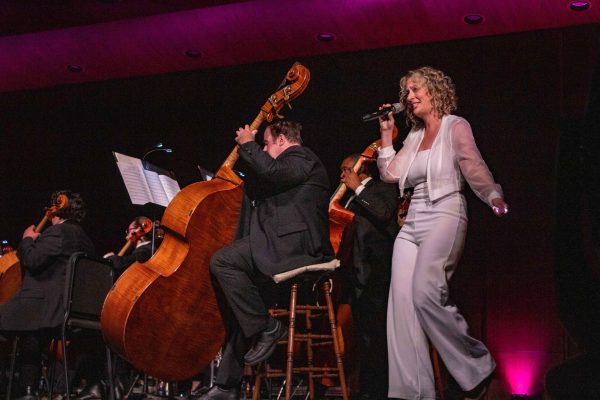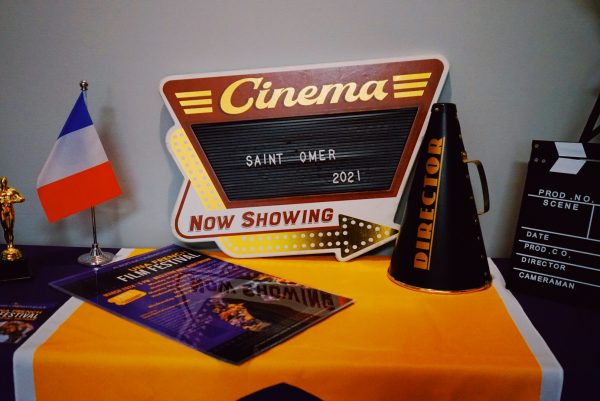Why Elvis (2022) Felt Like Going to Golden Corral
August 25, 2022
Elvis Presley is undoubtedly what many would consider an inter-generational heartthrob. He is largely credited with the birth of teen fan culture, as well as breaking barriers between traditionally white and African-American genres of music. Fans all across Tik Tok are raving about his new biographical feature, but does it live up to the hype?
The story is told through the eyes of Col. Tom Parker, Elvis’s talent manager, played by Tom Hanks. From the very first words spoken, this film is set up to be the Colonel’s defense – his attempt to explain away the years of exploitation and abuse leading up to Presley’s death. Col. Parker vehemently denies having anything to do with the musician’s death, and persists by declaring his innocence in a series of monologues throughout the course of the movie.
But, between these scenes, the majority of the movie showcases different influential moments in the life of Elvis Presley, played by Austin Butler. Beginning with his childhood, the film shows Elvis growing up in a poor, black community with his mother after his father gets arrested for forging a check. It starts with a scene of a young, impoverished Elvis sneaking around with his friends to peer in on a jazz club, and very quickly becoming entranced with the music on the other side of the wall. Moments thereafter, he notices a revival tent across the road with loud praise floating out. He bolts over, and quickly loses himself to the blend of music. This scene is a very early nod to the influence that Black culture had on Elvis’s music and success, and in these moments away from the narration of Col. Parker, the movie almost reclassifies itself to be a cradle-to-grave biopic, focused on Elvis himself.
Because 42 years is a lot to take on within the confines of a single feature film, many aspects of Elvis’s life are glossed over, and heavily oversimplified. This would be fine, if the film had committed to focusing on the relationship between the Colonel and Elvis as established in the beginning, but when the film starts to bring to life events entirely outside of Elvis’s business relationship with Col. Parker into the main narrative without completely contextualizing how those events affected Elvis’ personal growth and progression, things become very muddy very fast. Since the movie isn’t fully dedicated to either the Colonel, Elvis, or their business relationship, the viewer is left to question, “Who is this movie supposed to be about?”.
This is where one of the film’s primary weaknesses comes in: It is simply trying to be too many things at once. The audience is force-fed too much at one time, leaving the viewing experience to be exhausting and almost reminiscent of a trip to a dated all-you-can-eat with your family on Sunday afternoon. The lack of a core identity is also reflected in its structure. The director (Baz Luhrmann) uses a sort of time-jump format, but does so inconsistently and without much distinction between past and present.
For example, the first time we see Elvis and Col. Parker on screen together, the Colonel is following Elvis around a carnival, as if he’s seeing him for the first time and realizing that this kid may be his ticket to greatness. Now, it’s very likely that this is meant to symbolize how the nature of the carnival – where the Colonel worked for much of his life – and the music business are all about putting on the act that makes the most money, but the audience doesn’t realize this until after the fact. Because the style remains so consistently surreal and campy throughout the whole of the movie, it’s hard to distinguish between dream-like/fantasy sequences and real plot events. When Col. Parker finally does actually learn of and see Elvis for the first time a few scenes later, the viewers are left a little confused because we were led to believe he was already in pursuit of “his boy.” This is just one of the multiple examples of timelines or reality/non-reality getting crossed without much clarity, leaving viewers to digest and untangle what’s happening on their own.
Plenty of movies have successfully executed time jumps, but the key is consistency and distinction. Greta Gerwig’s Little Women (2019), for example, does a great job of switching between the past and present with the use of color. Scenes set in the past or childhood are very visually warm and gold toned, while present scenes are very blue, gray, and cold. This not only serves to communicate the time jumps, but also does a great job at communicating the feelings and circumstances of the characters within the respective time periods as well. If you’ve ever seen The Great Gatsby (2013), you’re already familiar with Luhrman’s elaborate style. His works are known as eye candy with a style so distinctive it practically serves as an autograph. However, it unfortunately begins to become a disadvantage when the structural integrity of the story is lost between spinning fruits on slot machines and nauseating amounts of neon glowing off of a sweaty Austin Butler as he purses his lips and wiggles around like an erotic roadside inflatable man.
As previously mentioned, many aspects of Elvis’s life are acknowledged, but never fully developed. This is to be expected, of course, when you are covering an entire lifetime over the span of two-and-a-half hours. However, it becomes a problem when these brief touches of information are later suddenly presented as if they were major plot points all along. For example, Elvis’s divorce. In the scene where Elvis wakes up to Priscilla packing up her things, he asks her directly if it’s because of his infidelity. For context, leading up to this point, we’ve watched Elvis cheat on his wife multiple times while touring, and he even goes as far as to kiss fans in front of her at the end of his first International Hotel performance. So, when Elvis directly initiates this confrontation that the audience has naturally been anticipating for a while, it comes to a plateau when Priscilla quickly dismisses the notion entirely. “The girls? You think I give a shit about the girls that you sneak in through the side door?” She instead expresses that her main concern is her husband’s drug abuse by throwing his pills at him. This comes as a little bit of a surprise because Elvis’s problem with substance abuse was nearly forgotten by this point in the movie. I think if the writers had given more time to his struggle with addiction than his affairs, this scene wouldn’t have felt as awkward and out of place.
Overall, many aspects of the film feel abandoned or unfinished, and this, combined with the cartoonish, sugary visuals, leaves the audience feeling full of empty calories and confusion. It seems like a series of afterthoughts and fever dreams all strung together with a Doja Cat song, which is fun to watch on its own, but doesn’t work well for a near three hour experience. However, as much as I’ve criticized this work, I would give it a 3 out of 5 because there’s never a dull moment and it’s a fun way to spend a night with your friends.


